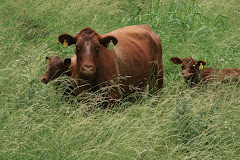A Statement of Concern Regarding Mining and Agriculture on the Darling Downs
The local leadership of the Anglican, Catholic and Uniting Churches on the Darling Downs have great concerns about the impact of some proposed mining activity on prime agricultural land. They support calls for a regional plan that would identify areas which could be mined and others which should be kept for sustainable agriculture and food production. Two areas in the region currently under consideration for coal mining are Felton and Haystack Plain.
Caring for creation is a strong part of the three Christian traditions. We believe that we are called to be wise stewards of the earth. In terms of our fragile planet we are facing an ecological crisis. Respect for nature and ecological responsibility are key parts of our faith.
Transformation to wise and sustainable use of the environment is at heart a spiritual matter. Environmental concern is a legitimate and necessary part of a Christian's response to God's loving provision for us. (Green by Grace A Report prepared for the General Synod of the Anglican Church of Australia 2004)
Experience shows that disregard for the environment always harms human coexistence, and vice versa. It becomes more and more evident that there is an inseparable link between peace with creation and peace. (Message of his Holiness Pope Benedict XVI for the celebration of the World Day of Peace 1 January 2007)
We are concerned with the basic human rights of future generations and will urge the wise use of energy, the protection of the environment and the replenishment of the earth’s resources for their use and enjoyment. (Uniting Church, Statement to the Nation, 1977)
As communities of faith we stand in solidarity with those farmers who fear for their security and future way of life at this time. We also understand the contribution of mining and the generation of electricity in our region. We have a particular perspective on development which centres on the human person, the family and the community. When we consider future planning or development our primary question would be, “What is happening to the people?” rather than “What is happening to the economy?”
With the current world food shortage we believe it is important to protect land that has a history of sustainable food production. With a growing understanding about the impact of climate change we would also urge the Queensland State government to consider alternatives to coal mining in the Felton and Haystack Plain districts. These alternatives should be more sustainable and contribute more to the local community and economy.
We have concerns that the proposed coal mines will have an irreversible damaging impact on the soil and people of Haystack Plains and Felton. We would urge respectful and genuine dialogue between the resources and agricultural sector. For generations farmers in the Felton and Haystack Plains district have produced food for the wider Australian and international community. They have adapted their practises to ensure that future families can also live from and with the land. Our hope is that decisions made on the future use of these areas are based on the common good of all humanity.
Bishop Rob Nolan (Bishop of the Western Region, Anglican Diocese of Brisbane)
Bishop William Morris (Catholic Diocese of Toowoomba)
Sharon Kirk (Presbytery Minister Uniting Church in Australia Downs Presbytery)
Thursday, July 9, 2009
Subscribe to:
Post Comments (Atom)






No comments:
Post a Comment